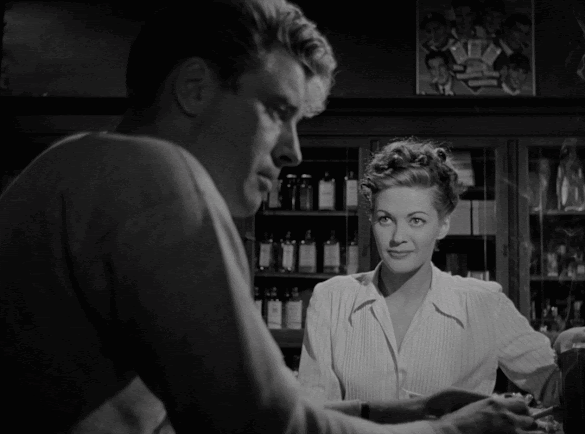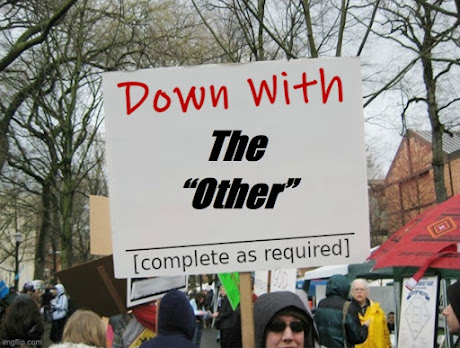Doomed. Everyone is Dooooomed!
When I launched this current series of films back in January, I dubbed it Post-Depression Tragedy; partly to compliment the series I had presented last year (Depression/Comedy).
But beyond that, I personally feel that 1940s film noir is more than just "Dark Cinema". I chose the word Tragedy very deliberately.
Scarlet Street, which I didn't screen last week, is about as dark as they come, but it's also cruel and sadistic; and it brutally punishes the main character chiefly because (in the judgement of the screenplay) he is the most pathetic order of life on the planet: a man who isn't a man.
At the very beginning of this series I quoted Jean Anouilh's discussion of Tragedy, which he describes as "restful". True tragedy is never sadistic or cruel because (in his reading) it is inevitable. There is no hope of escape because there is nowhere else for the story to go, and "that makes for tranquillity," as he puts it. "Straight down the line," as Walter Neff and Phyllis Dietrichson repeatedly say to each other in Double Indemnity.
Where we went wrong was getting on a boat. We can move, of course, change direction, rattle about, but our movement is contained within a larger one that carries us along as inexorably as the wind and current...
Tom Stoppard; Rosenkranz and Guildenstern are Dead
If I had to pick one single film that captures the sheer inevitability of noir it would probably be the film I am screening this week (which will be our final evening before we take a break for the holiday season).
Criss Cross could have been specifically made to wrap up all the films I have been showing since January.
It's directed by Robert Siodmak (The Killers; Phantom Lady) and reunites him with Burt Lancaster, who had made his debut in The Killers three years earlier (or two months earlier from our point of view!).
It features a particularly menacing performance by Dan Duryea (Too Late for Tears; Woman in the Window, plus the afore-mentioned Scarlet Street) here playing an especially unsavoury character...
The music is once again by Miklos Rozsa (Double Indemnity; The Killers; The Secret Beyond the Door) who provides a monumental score that tells you from the very first notes that everyone in the story is doomed. (That's not really a spoiler, by the way. This is the noirest of noirs. No one is walking away at the end. Tragedy, remember?)
Burt Lancaster plays Steve Thompson, an upright, forthright young man who has left town following the breakup of his marriage to Anna (Yvonne DeCarlo). Now he has returned, and he finds himself inevitably drawn back into Anna's orbit, despite the advice to stay away from her from everyone else in his life.
It's very clear from the moment that she appears on screen that Anna is bad news, but Steve can't take his eyes off her (literally - remember all that stuff about the "male gaze"?).
Unfortunately she is now running around with the gangster "Slim" Dundee (Dan Duryea, in case you hadn't guessed) so Steve approaches Slim with a business proposition as an excuse to stay close to Anna.
Steve, by the way, has taken a job driving an armoured car.
It doesn't exactly take a PhD to figure out where the plot of Criss Cross is going (or where it's going to end) and indeed that point was commented upon in contemporary reviews. But I would argue that that's precisely why Criss Cross is such a good example of the tragedy of noir.
From the moment the credits begin to roll, Miklos Rozsa's apocalyptic music tells us (in grand, orchestral terms) that no one in this film is going to live happily ever after. (The term doom-scrolling was still seventy years in the future, but that basically describes what the opening credits are doing here..)
Stick with the dog, forget about Yvonne DeCarlo, and you might survive this...
Crucially, everything that happens to Steve from the moment he returns home is 100% of his own making. He is warned (repeatedly!) by his friends and family to stop what he is doing, plus he was already married to Anna once before (translation: they've had sex) so he goes into this with his eyes open and many, many opportunities to walk away.
I think we all know that he isn't going to walk away. He was never going to walk away. But he is what he is, and she is what she is, and the Hollywood Production Code is an immovable object.
Never try to pull the "Male Gaze" on Dan Duryea. You won't win.
In the best tradition of grand tragedy, we know going in that everyone is doomed. Once that is established, everyone can relax. That's one of the reasons why noir at its best is paradoxically uplifting. Everything plays out exactly as it should, and there is an odd calm that can come out of the total inexorability of it all. The tranquillity, as Anouilh would say.
In tragedy, nothing is in doubt and everyone's destiny is known. That makes for tranquillity. [...] Tragedy is restful; and the reason is that hope, that foul, deceitful thing, has no part in it. There isn't any hope. You're trapped.
Jean Anouilh; Antigone
Criss Cross may not be the most famous of the noir thrillers of the 1940s, but I would be hard pressed to think of one that distils the idea of noir quite so perfectly. It tells a simple, direct story with a great deal of style and confidence, and it builds to a conclusion that is as haunting as it is unstoppable.
We will screen Criss Cross (our final film before Easter) at 7.30 on Thursday, the 10th of April at the Victoria Park Baptist Church.





















Comments
Post a Comment